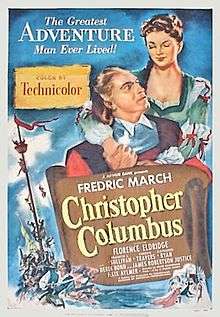Christopher Columbus (1949 film)
| Christopher Columbus | |
|---|---|
 | |
| Directed by | David MacDonald |
| Produced by |
Sydney Box A. Frank Bundy |
| Written by |
Muriel Box Sydney Box Cyril Roberts |
| Based on | novel Columbus by Rafael Sabatini |
| Starring |
Fredric March Florence Eldridge Francis L. Sullivan Kathleen Ryan |
| Narrated by | Valentine Dyall |
| Music by | Arthur Bliss |
| Cinematography | Stephen Dade |
| Edited by | Vladimir Sagovsky |
Production company | |
| Distributed by |
GFD (UK) Universal Pictures (US) Gaumont (France) |
Release dates | 12 October 1949 |
Running time | 104 minutes[1] |
| Country | United Kingdom |
| Language | English |
| Budget | ₤200,000[2] |
Christopher Columbus is a 1949 British biographical film starring Fredric March as Christopher Columbus and Florence Eldridge as Queen Isabella. It is loosely based on the novel Christopher Columbus by Rafael Sabatini with much of the screenplay rewritten by Sydney and Muriel Box.[3]
Plot
Christopher Columbus overcomes intrigue at the Castillan court and convinces Queen Isabella that his plan to reach the East by sailing west is practical.
Cast
- Fredric March as Christopher Columbus
- Florence Eldridge as Queen Isabella
- Francis L. Sullivan as Francisco de Bobadilla
- Kathleen Ryan as Beatriz
- Derek Bond as Diego de Arana
- Nora Swinburne as Joanna de Torres
- Abraham Sofaer as Luis de Santangel
- Linden Travers as Beatriz de Peraza
- James Robertson Justice as Martin Pinzon
- Dennis Vance as Francisco Pinzon
- Richard Aherne as Vicente Pinzon
- Felix Aylmer as Father Perez
- Francis Lister as King Ferdinand
- Edward Rigby as Pedro
- Niall MacGinnis as Juhan de la Costa
- Ralph Truman as Captain
- Ronald Adam as Talavera
- Guy Le Feuvre as Admiral
- Lyn Evans as Lope
- David Cole as Columbus' Son
- Hugh Pryse as Almoner
- Stuart Lindsell as Prior
Production
The film was part of a deliberate attempt by the Rank Organisation to break into the American market, following the path blazed with films like Henry V (1944) and Caesar and Cleopatra (1945). John Woolf, head of international distribution for Rank, said in 1946 that:
Before we smacked Henry V and Caesar and Cleopatra into the American Markets, we were getting a poor showing in the United States. Although the most optimistic figures have been put out in London about the achievements of Henry and Caesar, in fact they have had to fight hard to make their way. The important thing to remember is this— that these big films enabled us to break through the highly controlled theatre circuits in America. We are using them as a spearhead to get a showing of British films.[4]
Stewart Granger was originally announced as the star. For a time it seemed there would be a rival movie on the same subject produced by Edward Small from a biography by David Lawrence.[5]
The Francoist Spanish government considered the portrait of Columbus to be unflattering. In response the leading Spanish studio CIFESA produced Dawn of America (1951), which portrayed Columbus as a more daring figure.
References
- ↑ Some versions of the film were cut to 95 minutes. Spicer p.128
- ↑ Geoffrey Macnab, J. Arthur Rank and the British Film Industry, London, Routledge (1993) p183
- ↑ Spicer p.127-128
- ↑ "COLUMBUS IN A NEW BATTLE OF BRITAIN.". Townsville Daily Bulletin (Qld.: National Library of Australia). 7 October 1946. p. 6. Retrieved 13 July 2012.
- ↑ RANDOM NOTES ABOUT FILMS: Hollywood and England Discover Columbus--New Theatre--Code Revised New Show House Ban Eased Professional Opinion But He Doesn't Sing By A.H. WEILER. New York Times (1923-Current file) [New York, N.Y] 22 Sep 1946: X3.
Bibliography
- Spicer, Andrew. British Film Makers: Sydney Box. Manchester University Press, 2006.
External links
- Christopher Columbus at the Internet Movie Database
- Original text of novel Columbus by Rafael Sabatini at Project Gutenberg
| ||||||
|